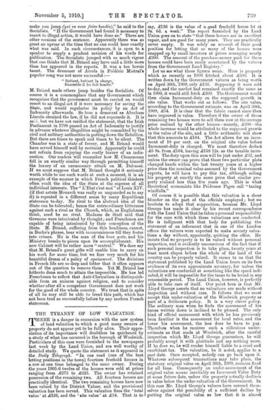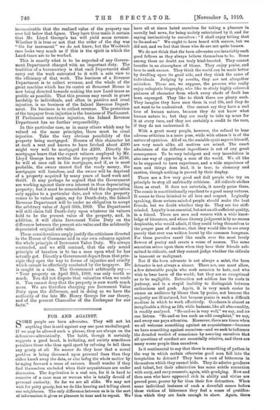THE TYRANNY OF LOW VALUATION. T HERE is a danger in
connexion with the new system of land valuation to which a good many owners of property do not appear yet to be fully alive. Their appre- ciation of its importance will doubtless be quickened by a study of what has occurred in the borough of Woolwich. Particulars of this case were furnished to the newspapers last week by the Land. Union, and are well worthy of detailed study. We quote the statement as it appeared in the Daily Telegraph,. "In one road (one of the best letting positions in the town) fourteen freehold houses in a row at one time belonged to the same owner. During the years 1905-6 twelve of the houses were sold at prices ranging from .2275 to .2325. The owner has retained possession of the remaining two. All fourteen houses are practically identical. The two remaining houses have now been valued by the District Valuer, and the provisional valuation has been served. This valuation fixes the total value' at .2136, and the site value' at £54. That is to say, .2136 is the value of a good freehold house let at 9s. 6d. a week." The report furnished by the Land Union goes on to state "that these houses are in excellent repair, and are good for many years. They are practically never empty. It was solely on account of their good position for letting that so many of the houses were snapped. up by small investors at prices averaging nearly 2300. The amount of the purchase-money paid for these houses could have been easily ascertained by the valuers from the Government Land Registry."
Let us see what these figures mean. Here is property which as recently as 1906 fetched about 02300. It is written down by the Government valuers as being worth on April 30th, 1909, only 2136. Supposing it were sold. to-day, and the market had remained exactly the same as in 1906, it would still fetch £300. The Government would then claim Increment-duty on the supposed growth in site value. That works out as follows. The site value, according to the Government estimate, was on April 30th, 1909, .254. It is clear that the fabric cannot since then have improved in value. Therefore if the owner of these remaining two houses were to sell them now at the average price realised by the other houses—namely, .2300—the whole increase would be attributed to the supposed growth in the value of the site, and a little arithmetic will show that this amounts to .2164. The Act allows for an incre- ment of 10 per cent. on the original site value before Increment-duty is charged. We must therefore deduct .25 8s. from .2164, leaving .2158 12s. as the taxable incre- ment. The duty upon this sum will be just under .232, and unless the owner can prove that these two particular plots changed hands within the last twenty years at a higher price than the nominal value assessed by the Government experts, he will have to pay this tax, although selling his property at exactly the same price that similar pro- perty realised less than five years ago. This is what theoretical economists like Professor Pigou call "taxing windfalls."
Of course it is possible that this valuation is a sheer blunder on the part of the officials employed ; but we hesitate to adopt that supposition, because Mr. Lloyd. George has made it clear by his recent correspondence with the Land Union that he takes a personal responsibility for the care with which these valuations are conducted. He is indignant with that body for publishing the statement of an informant that in one of the London offices the valuers were expected to make seventy valua- tions a day without, apparently, quitting the office. He insists that no property is to be valued without personal inspection, and is evidently unconscious of the fact that if such personal inspection is to take place, twenty years at least must elapse before the whole of the land of the country can be properly valued. It seems to us that the statement published by the Land. Union bears on its face evidence of its own approximate accuracy, for unless the valuations are conducted at something like the speed indi- cated, it will be impossible for the taxes to be levied in any reasonable period. The Land Union, however, is perfectly able to take care of itself. Our point here is that Mr. Lloyd George asserts that no valuations are made without inspection and without care. It follows that we must accept this under-valuation of the Woolwich property as part of a deliberate policy. It is a very clever policy. The ordinary man when he finds the assessment of his house written down is inclined to be pleased. The only kind of official assessment with which he has previously been familiar is the assessment for local rates, and the lower his assessment, the less does he have to pay. Therefore -when he receives such a ridiculous under- estimate as that made at Woolwich, after the careful inspection which Mr. Lloyd George guarantees, he will probably accept it with gratitude and say nothing more. If he does so, he will render himself liable to a cruel and. exorbitant tax. The valuation, be it noted, applies to a past date. Once accepted, nobody can go back upon it. Whatever subsequent transactions may take place, the statutory original value on April 30th, 1909, remains fixed for all time. Consequently an under-assessment of the original value means inevitably an Increment Value Duty at some future date, unless the property actually declines in value below the under-valuation of the Government. In this case Mr. Lloyd George's valuers have covered them- selves against the possibility of a sufficient decline by putting the original value so low that it is almost inconceivable that the realised value of the property can ever fall below that figure. They have thus made-it certain that Mr. Lloyd George's tax will yield some revenue. Whether it is true or not that the order of the day was "Go for increment" we do not know, but the Woolwich case looks very much as if this is the spirit in which the Laud-taxes are to be worked.
This is exactly what is to be expected of any Govern- ment Department charged with an important duty. The tradition of a bureaucracy is that each Department shall carry out the work entrusted to it with a sole view to the efficiency of that work. The business of a Revenue Department is to collect revenue, and the whole of the great machine which has its centre at Somerset House is now being directed towards making the new Land-taxes as prolific as possible. That this process may result in grave hardship to individuals, and often in positive and cruel injustice, is no business of the Inland Revenue Depart- ment. Its business is to collect revenue. The protection of the taxpayer from injustice is the business of Parliament. If Parliament sanctions injustice, the Inland Revenue Department has no further responsibility.
In this particular case, as in many others which may be valued on the same principles, there must be cruel injustice. Take the very obvious possibility of the property being mortgaged. Houses of this character let at such a rent and known to have fetched about £300 might very well be mortgaged for £200. Directly the mortgagee hears that the expert valuers employed by Mr. Lloyd George have written the property down to £136, he will at once call in his mortgages, and if, as is most probable, the owner cannot find the ready money, the mortgagee will foreclose, and the owner will be deprived of a property acquired by many years of hard work and thrift. It may perhaps be argued that the Government are working against their own interest in thus depreciating property; but it must be remembered that the depreciation only applies to a particular date, and when the property comes to be valued again, say for Death-duty, the Inland Revenue Department will be under no obligation to accept the arbitrary value of April 30th, 1909. The Department will still claim full Death-duty upon whatever its valuers hold to be the present value of the property, and, in addition, it will claim Increment Value Duty on the difference between the present site value and the arbitrarily depreciated original site value.
These considerations amply justify the criticisms directed in the House of Commons and in our own columns against the whole principle of Increment Value Duty. We always contended, and we still contend, that the only sound principle of taxation is to tax a man upon what he has actually got. Directly a Government depart from that prin- ciple they open the way to forms of injustice and cruelty which cannot be effectively combated by the taxpayer. He is caught in a vice. The Government arbitrarily say :— " Your property on April 30th, 1909, was only worth so much. You did not dispute that valuation when we made it. You cannot deny that the property is now worth much more. We are therefore charging you Increment Value Duty upon the difference, and in doing so we have the authority of the late Mr. Henry George for our theory, and of the present Chancellor of the Exchequer for our facts."



































































 Previous page
Previous page